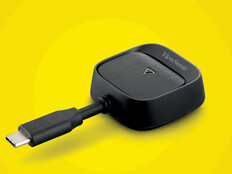ViewSonic Lights It Up
The ViewSonic PJD7583wi projector is as versatile as they come. It can handle a variety of visual materials, including PowerPoint slides and videos in widescreen format. But it's a lot more than just a plain old projector. This device is a short-throw projector, which means it can be placed very near the screen and still provide a full image. In fact, while testing in a classroom environment, we found that placing the projector less than 3 feet away still fills a large ceiling-mounted screen.
The projector is designed to be controlled by the computer that's showing the images. It has an Ethernet port for controlling the device remotely and an interactive pen for drawing on the projected image (as an instructor would on a smartboard). Users can mount the projector on a table, on the ceiling or behind the screen, depending on their needs.
End-User Advantages
This projector will work well in virtually any educational environment. It can fill the screen in an auditorium just as easily as it does in a small conference room. The short-throw feature means that users can have the projector in the front of the room, next to the presenter, rather than farther back where it might interfere with visibility. This also means that the computer can be in the front of the room along with the projector, putting an end to those continuous strolls back and forth to change slides or complex setups that require help from AV staff.
The short-throw feature requires a short learning curve for those used to regular projectors. The average user will almost certainly set it up too far away the first time, and possibly even the second time. But once the projector is positioned properly (there's a guide in the manual), it will work fine, and focus is easy to achieve using the front-mounted ring.
The interactive pen looks vaguely like a high-tech magic wand, but it's really a wireless mouse that reacts to the movement of the device in the user's hand. Coupled with the ViewSonic ViewDraw application, users can draw or write on the projected image. It works like an interactive whiteboard in that images can be saved for later use.
Why It Works for IT
An Ethernet port on the projector allows control of the device by browsing to its IP address for a web-based control panel. This feature lets users and IT staff turn the projector on or off remotely, as well as change all of the other settings that are available through the on-screen menu or the handheld remote. What's great for the IT staff is they can manage the projector from anywhere – turning it on, setting it up and even preventing access by unauthorized persons, all remotely.
Because this projector runs in a variety of positions, installation is very easy. Also, the brightness level is unusually high. I tested the PJD7583wi in a well-lit room, using a lenticular screen facing directly into the sunlight. The image was perfectly visible, and the colors were not washed out by the high ambient light.
Disadvantages
ViewSonic needs to update its manuals and install software to handle Windows 7 gracefully. While it works fine with the OS, the installation software makes it appear to have failed, when in reality Windows 7 doesn't need the installation software at all. In addition, there's only one very short USB cable included. Two are required: one for charging the interactive pen and one for the projector. The included cable is too short to reach the projector from any reasonable position.








